Port Adaptation and Efficiency: An Empirical Study of Ghanaian Ports
DOI:
https://doi.org/10.5296/ijrd.v8i2.18942Abstract
The port being an economical leg of countries development and thereby affected by climate change creates a substantial cost to the various stakeholders since is described as a “business” hub. It is, therefore, essential that ports across the globe attribute much importance to climate adaptation and its relation to port efficiency, especially for the coming years. The need to establish the effect these variables have on each other has become paramount. For this study, an empirical analysis of Ghanaian ports is being reviewed for the past and future annual efficiencies and adaptation scores. The annual efficiencies of both ports are calculated using various variables as inputs and outputs with the DEA Frontier software to calculate the DEA-CCR of the study ports. To assess the adaptation scores of each port, questionnaires and interviews were conducted based on four (4) major factors that affect port adaptation. This research also employs the linear mixed model and one-way ANOVA to assess the means of the data groups obtained for 2009-2020 & 2021-2040 respectively. This research aimed to analyse the significant relationship between port adaptation and efficiency for past and future years while highlighting the adaptative strategies of Ghanaian ports. The concluding chapters of this research represent the data analysis, policy recommendation for the stakeholders of Ghanaian ports, and also recommendations that are deemed useful for further research.
Downloads
Published
How to Cite
Issue
Section
License
Copyright (c) 2024 International Journal of Regional Development

This work is licensed under a Creative Commons Attribution 4.0 International License.


